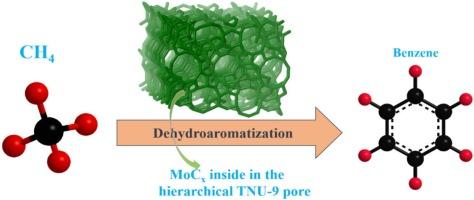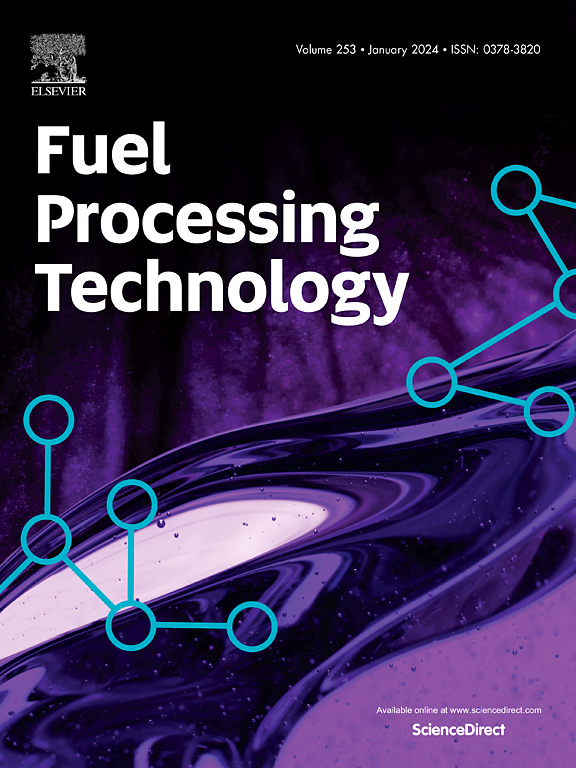分层Mo/HTNU-9促进甲烷芳构化,减轻碳沉积
IF 7.7
2区 工程技术
Q1 CHEMISTRY, APPLIED
引用次数: 0
摘要
甲烷脱氢芳化(MDA)为甲烷转化为芳烃提供了一条很有前途的途径,但通过焦化使催化剂快速失活仍然是一个关键障碍。本研究通过tpaoh辅助HTNU-9沸石的分层孔隙工程来解决这一挑战。控制脱硅(0.25 mol/L TPAOH, 24 h)生成微介孔Mo/HTNU-9-24,同时保持微孔完整性,在700℃下甲烷转化率提高22%(14.7%比原始Mo/HTNU-9的11.4%)。分层结构通过协同效应增强了传质和钼的分散。富硅醇的介孔表面和温和的碱度稳定了钼,选择性去除强酸位点加上介孔的空间限制减轻了焦炭的积累。优化后的催化剂表现出较长的稳定性,因为它限制了钼的团聚和有效的碳前驱体扩散。这些发现建立了一种双重策略(孔隙拓扑控制和酸位调制)来同步活性中心动力学和抗焦性,促进了分层沸石的合理设计,用于工业MDA应用。本文章由计算机程序翻译,如有差异,请以英文原文为准。

Hierarchical Mo/HTNU-9 boosts methane aromatization with mitigated carbon deposition
Methane dehydroaromatization (MDA) offers a promising route for converting methane into aromatics, yet rapid catalyst deactivation via coking remains a critical barrier. This study addresses this challenge through TPAOH-assisted hierarchical pore engineering of HTNU-9 zeolite. Controlled desilication (0.25 mol/L TPAOH, 24 h) generates micro-mesoporous Mo/HTNU-9-24 while retaining microporous integrity, achieving a 22 % increase in methane conversion (14.7 % vs. 11.4 % for pristine Mo/HTNU-9) at 700 °C. The hierarchical architecture enhances mass transfer and Mo dispersion via synergistic effects. Silanol-rich mesopore surfaces and mild alkalinity stabilize Mo species, selective removal of strong acid sites coupled with spatial confinement of mesopores mitigate coke accumulation. The optimized catalyst exhibits prolonged stability due to restricted Mo agglomeration and efficient carbon precursor diffusion. These findings establish a dual strategy (pore topology control and acid site modulation) to synchronize active center dynamics and coke resistance, advancing the rational design of hierarchical zeolites for industrial MDA applications.
求助全文
通过发布文献求助,成功后即可免费获取论文全文。
去求助
来源期刊

Fuel Processing Technology
工程技术-工程:化工
CiteScore
13.20
自引率
9.30%
发文量
398
审稿时长
26 days
期刊介绍:
Fuel Processing Technology (FPT) deals with the scientific and technological aspects of converting fossil and renewable resources to clean fuels, value-added chemicals, fuel-related advanced carbon materials and by-products. In addition to the traditional non-nuclear fossil fuels, biomass and wastes, papers on the integration of renewables such as solar and wind energy and energy storage into the fuel processing processes, as well as papers on the production and conversion of non-carbon-containing fuels such as hydrogen and ammonia, are also welcome. While chemical conversion is emphasized, papers on advanced physical conversion processes are also considered for publication in FPT. Papers on the fundamental aspects of fuel structure and properties will also be considered.
 求助内容:
求助内容: 应助结果提醒方式:
应助结果提醒方式:


